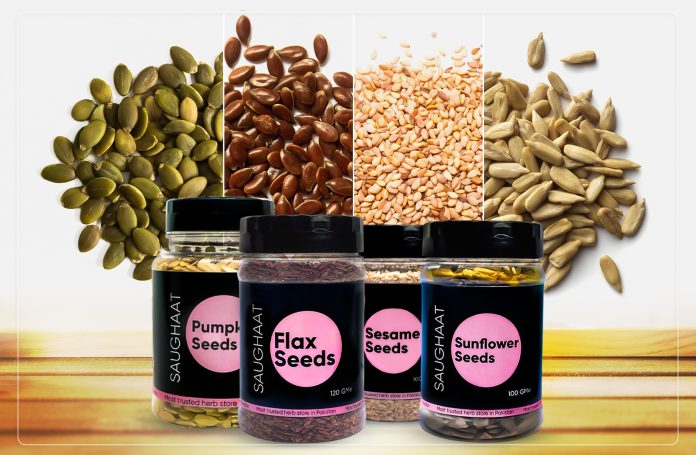Seed cycling is a natural and holistic approach to hormonal balance that involves incorporating specific seeds into your diet during different phases of your menstrual cycle. This practice is often utilized by individuals seeking to regulate their hormones, manage symptoms of hormonal imbalances, and support reproductive health. Seed Cycling in Urdu is known as Beej Cycling.
The fundamental theory behind this cycle is that some seeds include substances, such as phytochemicals and vital minerals, that can assist regulate hormones. This is how it usually operates:
- Follicular Phase (Days 1-14): In the follicular phase, it is recommended to use flax seeds (Alsi ke beej) and pumpkin seeds (Kaddu ke beej).
- Luteal Phase (Days 15-28): In the luteal phase, it is recommended to use sesame seeds (Til ke beej) and sunflower seeds (Suraj Mukhi ke beej). This phase starts from the 15th day of the month when ovulation begins.
The idea behind this cycling is to align seed consumption with the hormonal fluctuations that occur during the menstrual cycle. Furthermore, each person may react differently to this seed cycling procedure, and it may not be suitable for everyone. It is best to speak with a healthcare provider before beginning any new integrative health practice or diet, particularly if you are using medication or have underlying medical issues. They can provide guidance on whether this cycling is an appropriate approach for you.
Overall Benefits:
- Hormone Balance: This cycling is often used to help balance hormones, particularly in individuals with menstrual irregularities, PMS, or hormonal imbalances. The seeds used in this practice contain compounds that may support the body’s natural hormone production and regulation.
- Menstrual Regularity: This cycling can promote regular menstrual cycles in those with irregular periods or facing PCOS. It may help control hormone fluctuations and encourage regular periods by giving the body specific vitamins and minerals at different stages of the menstrual cycle.
- Symptom Management: A lot of individuals take this to treat symptoms like mood swings, abdominal pain, breast soreness, and acne that are brought on by hormone imbalances.By supporting hormone balance, it may alleviate these discomforts.
- Fertility Support: For individuals trying to conceive, this may aid in optimizing hormonal health, potentially enhancing fertility. Balanced hormones and regular menstrual cycles are crucial for successful conception.
- Nutrient-Rich Diet:Nutrient-dense seeds are employed in this phase, including sesame, sunflower, pumpkin, and flax seeds. They support general health by offering vital minerals, antioxidants, fiber, and healthy fats.
Benefits for Skin:
It is a dietary practice aimed at regulating hormones, can offer several benefits for skin health. Here’s how Seed Cycling benefits for skin:
- Reduced Acne: Acne is a common skin concern related to hormonal fluctuations. It may help manage acne by promoting hormonal stability and reducing the severity and frequency of breakouts.
- Skin Hydration: Seeds contain essential fatty acids that help maintain skin moisture and prevent dryness. Consuming seeds during this cycling can contribute to skin hydration and a more radiant complexion.
- Skin Repair and Renewal: The vitamins and minerals found in seeds, such as vitamin E and zinc, support skin repair and renewal processes. This can lead to smoother and healthier-looking skin.
- Antioxidant Protection: Seeds are rich in antioxidants, which combat free radicals and oxidative stress. This protection helps safeguard skin cells from premature aging and damage caused by environmental factors like UV radiation and pollution.
- Even Skin Tone: Hormonal fluctuations can lead to uneven skin tone and pigmentation issues. By stabilizing hormones, this may help improve skin tone and reduce the appearance of dark spots.
Conclusion
While there may be general health and skin advantages to this cycle, individual outcomes may differ. It’s critical to keep in mind that a variety of factors, such as genetics, nutrition, skincare practice, and lifestyle decisions, can affect the health of your skin. It should be incorporate into a comprehensive skincare and health regimen, but it may be a complimentary strategy to preserve hormonal balance.
To be sure that Seed Cycling PCOS is in line with your unique skincare requirements and general health objectives, speak with a healthcare provider or dermatologist before beginning or altering your diet significantly.







